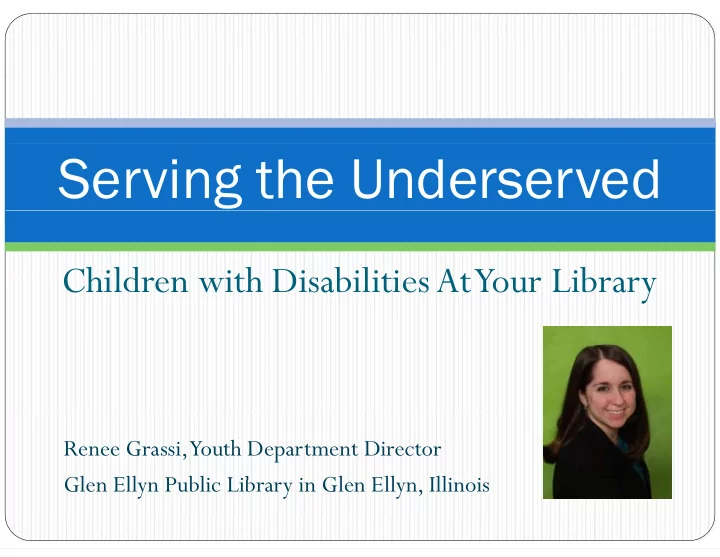

Serving the Underserved Children with Disabilities At Children with Disabilities At Your Library Your Library Renee Grassi, Youth Department Director Gl Glen Ellyn Public Library in Glen Ellyn, Illinois Ell P bli Lib i Gl Ell Illi i
Overview of Today’s Webinar The “Why?” Where Do h You Begin? Inclusive Customer Service Tips p Programming Making Accommodations M ki A d i Service Ideas Print and Online Resources
Awareness in October
Why serve the underserved? To support a traditionally underserved group To provide inclusion to those who might feel isolated To provide inclusion to those who might feel isolated To support opportunities for learning, social interaction, and connection among families To advocate for your library to non-users y y To be responsive to your community’s needs To fulfill the mission of your public library T f lf ll h f bl l b
Why serve the underserved? 56.7 million people, 18.7% had a disability in 2010 38.3 million people, 12.6 % had a severe disability p p , y 27% of U.S. adults live with a disability that interferes with activities of daily living ith ti iti f d il li i 1 in every 68 are born with Autism y 56% of students with ASD finish high school
Let Let s hear fr Let’s hear fr Let s hear from y hear from y om you! om you! u! u! What’s your “why?” Wh Why are you here today? h t d ?
Where do you begin? Disability Awareness Training
Where do you begin? Community Needs Assessment What information do you gather? How do you distribute it? d d b What incentives do you What incentives do you offer? What does this inform?
Where do you begin? Identify Partners
Where do you begin? Secure Funding
Inclusive Customer Service Tips Use Person First Language Adjust Your Mindset Be Patient Be Flexible Be Patient, Be Flexible Ask Simple Questions Ask Simple Questions Offer Choices Encourage Comments and Suggestions
Let’s hear fr Let’s hear from y om you! u! What programs have you offered What programs have you offered at your library for children at your library for children with special needs?
Methodology Behind Programming Benefits of Targeted Programs Benefits of Targeted Programs Drawbacks to Targeted Programs? Benefits of Inclusion Drawbacks to Inclusion Programs? Inclusion Programs?
Spectrum of Special Needs Programs Inclusive Playgroups Pl Sensory Storytime Movies & Music Read to Rover Stage Performances Stage Performances Sensory Friendly Films S F dl F l Gaming Sensory Performances Social Clubs Buddy Programs Buddy Programs Arts and Crafts Special Ed. Class Visits Cooking Programs Sensory Play Programs Exercise Exercise Library Tours Life Skills Targeted Targeted
Sensory Storytime Sensory Storytime Program Guidelines Series of four programs scheduled weekly Saturdays at 2 pm Length: 1 hour long with 30 min. for storytime & 30 min. for play Audience: children chronological ages 4 to 8 (w/ parent/caregiver) Program capacity: 10 children g p y: Advanced registration required with questionnaire Initial funding received from Target’s “Early Childhood Reading” Grant Program Title: Sensory Storytime--Stories & Emergent Literacy Activities for Children with Special Needs Program Outline P O li Review Boardmaker schedule “Hello” to each child Intro Song Intro Song Book Song Flannel Board Activity Book B k Song Playtime Bubbles Song “Wave Goodbye” by Rob Reid
Sensory Storytime Sensory Storytime
Sensory Storytime with Lekotek Inclusive Sensory Play
Sensory Storytime with Lekotek Movement & Crafts
Read to Rover Read to Rover • Local non-profit volunteer organization • Utilizes TDI certified therapy dogs that work in schools, nursing homes, at-risk ork in schools nursing homes at risk youth facilities, and assisted living facilities • Provides emotional support through pp g animal-assisted therapy Program Outline Program Outline 1 hr. storytime programs 30 min. storytime & 30 min. stations 30 min. storytime & 30 min. stations with crafts and dog-themed activities Programs targeted children ages of 5–8 and 8 16 and 8–16 Themes (Dogs, Animals, Colors)
Sensory Friendly Film Format Based on AMC’s “Sensory Friendly Films” for kids with autism Children of all ages and abilities with family members No registration required—drop-in d d Room setup Room is lighter with low volume Closed captioning on during movie Audience welcome to move around, talk and sing TV monitor with chairs arranged in auditorium style Large aisles and walkways in between chairs for accessibility Large aisles and walkways in between chairs for accessibility Movie tie-in books available for reading and checkout Fidgets, manipulatives, and puzzles made available Noise cancelling headphones
Special Education Special Education Class Visits
Smart Starts Provides a hands-on, interactive environment where children develop early reading, writing, and math skills through open-ended play Program promoted as “fun activities that build young brains!” Program promoted as fun activities that build young brains! Hosted three times a week with weekly themes for a 4-week series Designed for children ages 3 to 8 of all abilities with parent or caregiver Drop-in format with 6-8 stations around program room Crafts, games, and exploratory/sensory activities Encourages collaboration, problem solving, exploratory learning and socialization E ll b ti bl l i l t l i d i li ti
Making Accommodations: Visual Supports
Making Accommodations: Sensory Exploration
Making Accommodations: Movement Activities
Making Accommodations: Multiple Formats
Services Ideas -Family Tours -“This Is My Library” Social Stories -Web content -Resource Guides -Special Collections -Parent Workshops Parent Workshops -App Chats - Light It Up Blue Autism “Light It Up Blue” Autism Awareness Month Campaign
L t Let’ L t’ h t’s h hear h ear f f f fro rom yo you! ! How do you define success in library programs and services? Is it different for programs for kids with Is it different for programs for kids with disabilities?
Print Resources
Online Resources
Parting Thoughts
Thank you!! Thank you!! Renee Grassi, Youth Department Director Glen Ellyn Public Library y y rgrassi@gepl.org @MissReneeDomain @MissReneeDomain
Recommend
More recommend